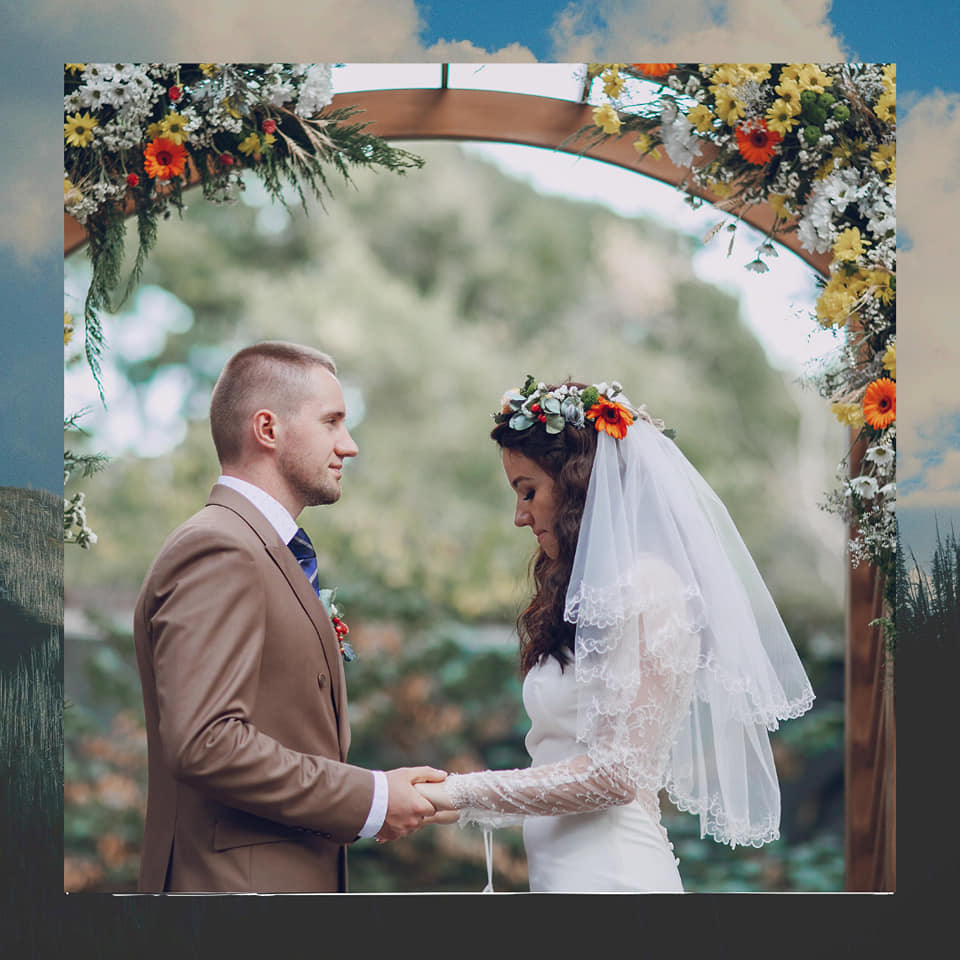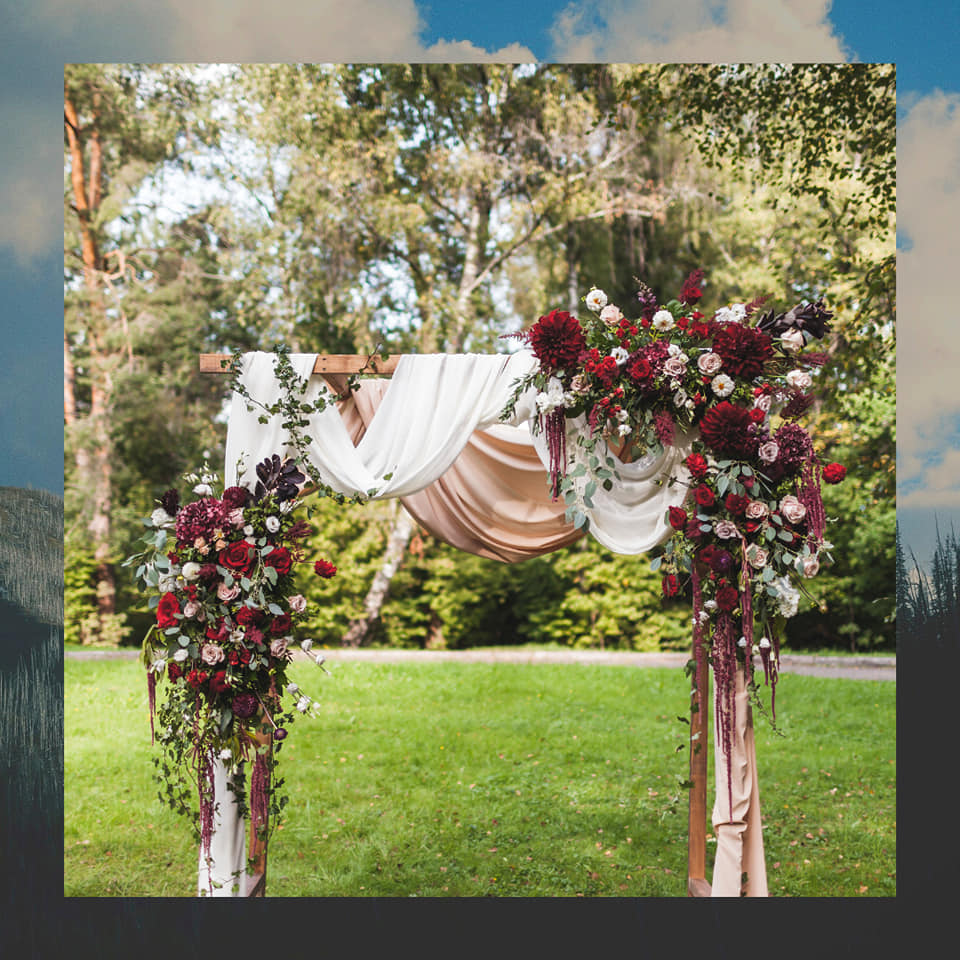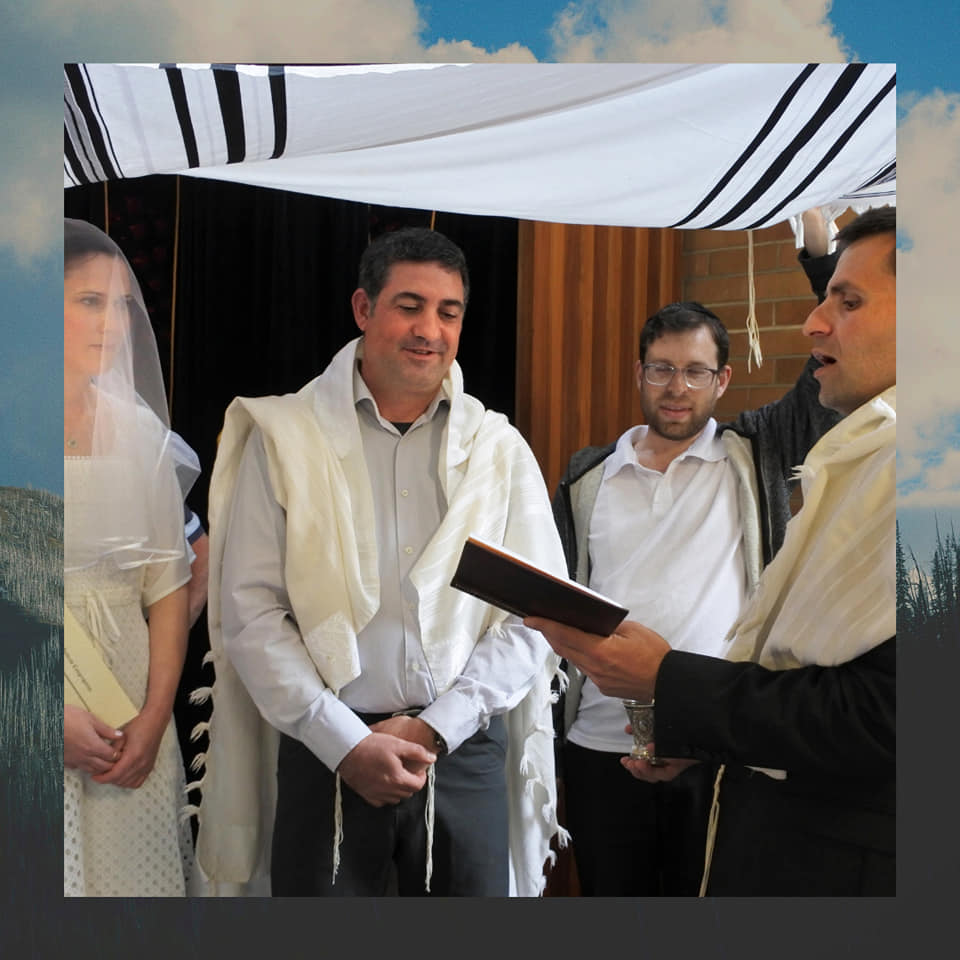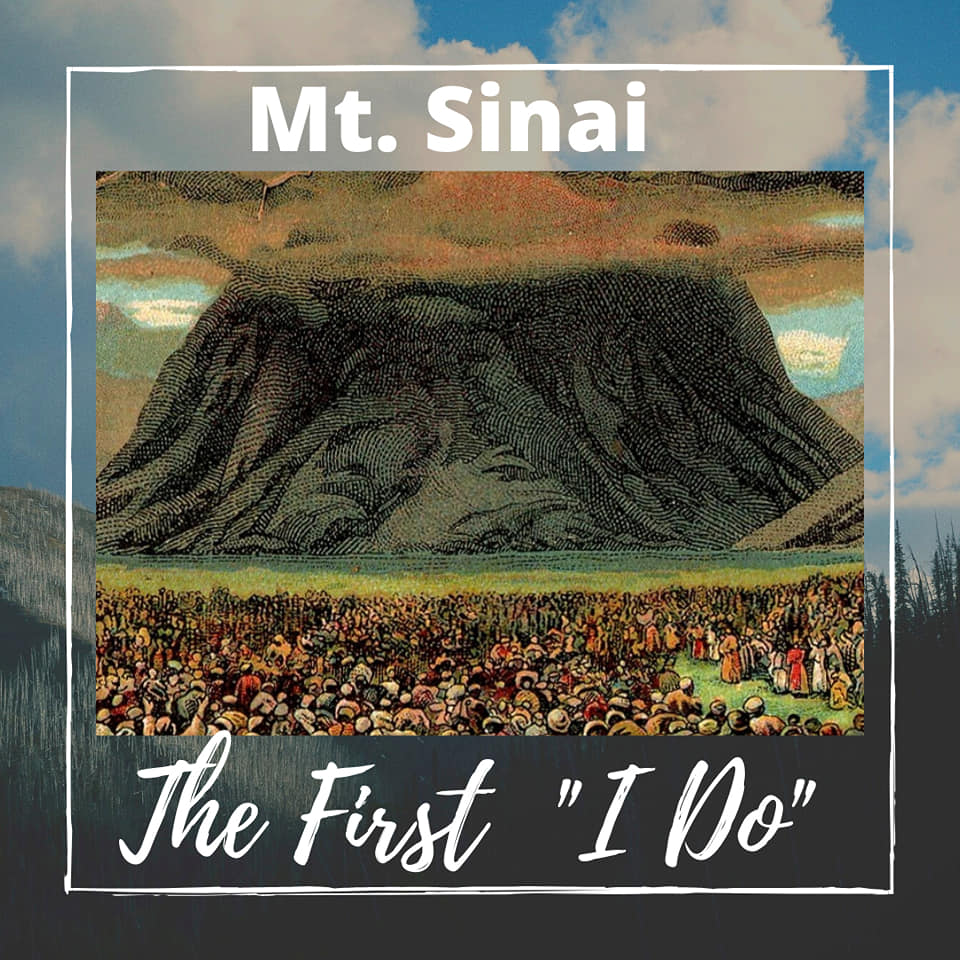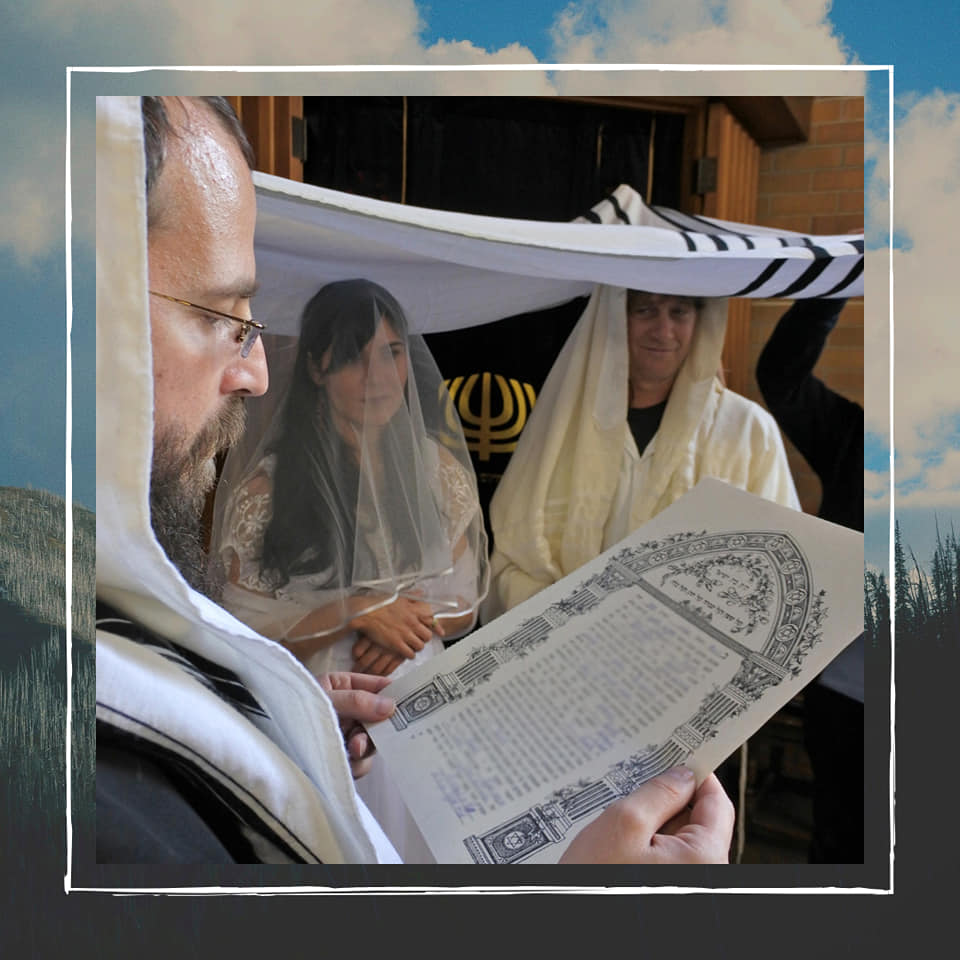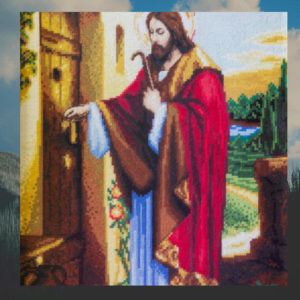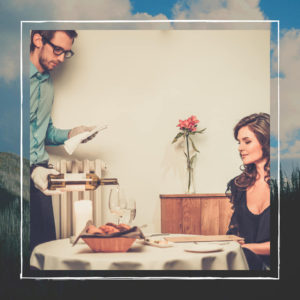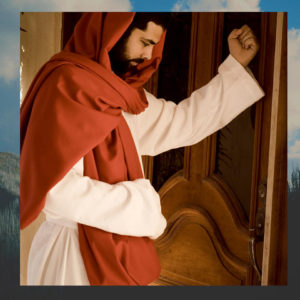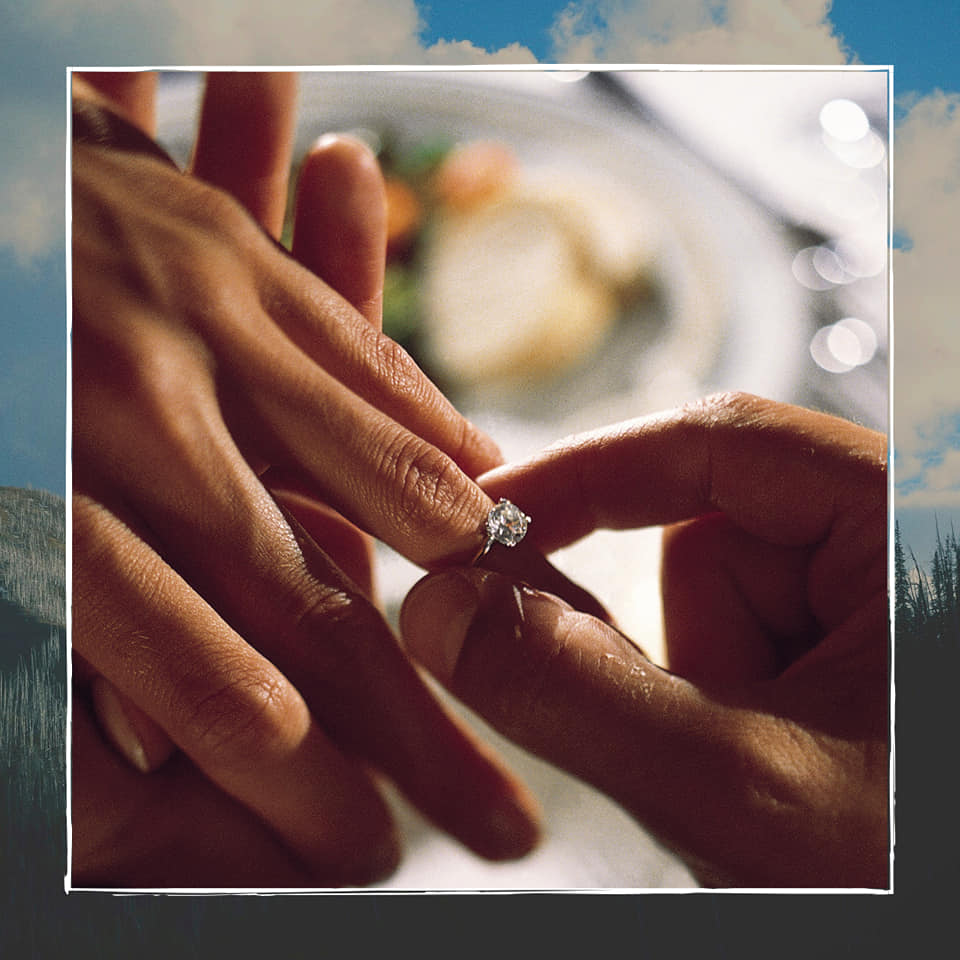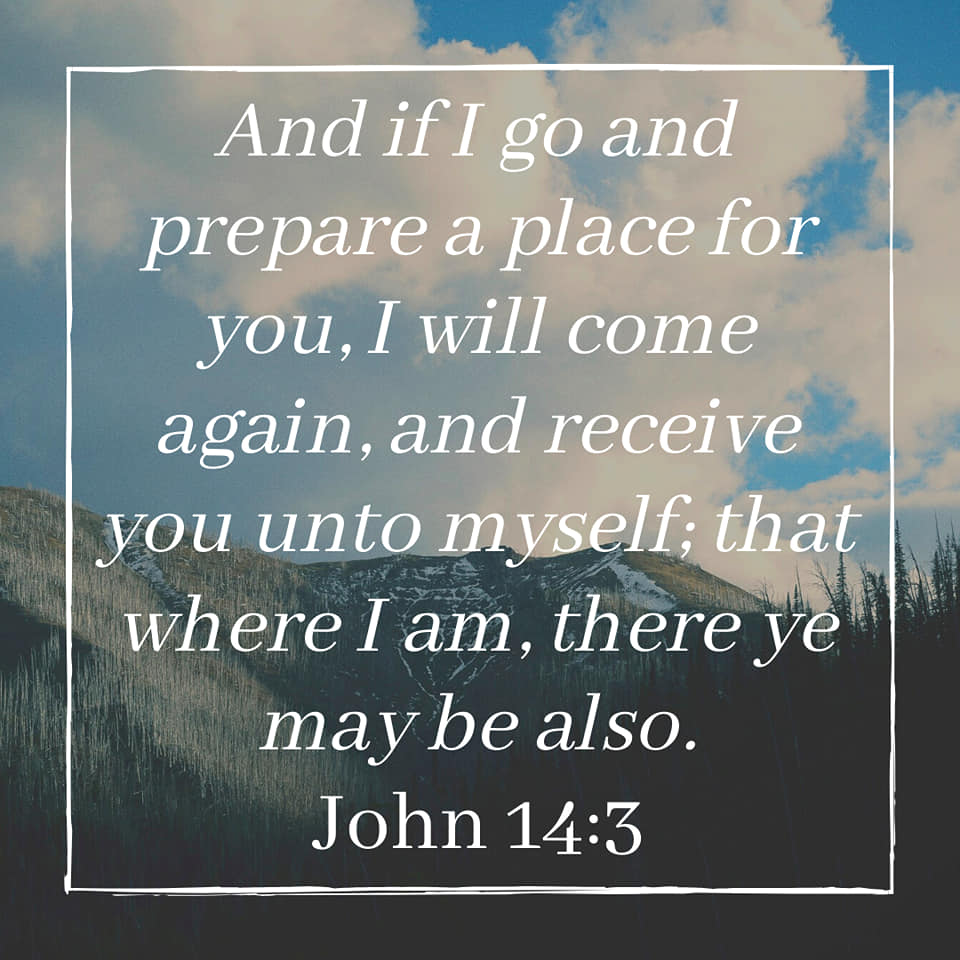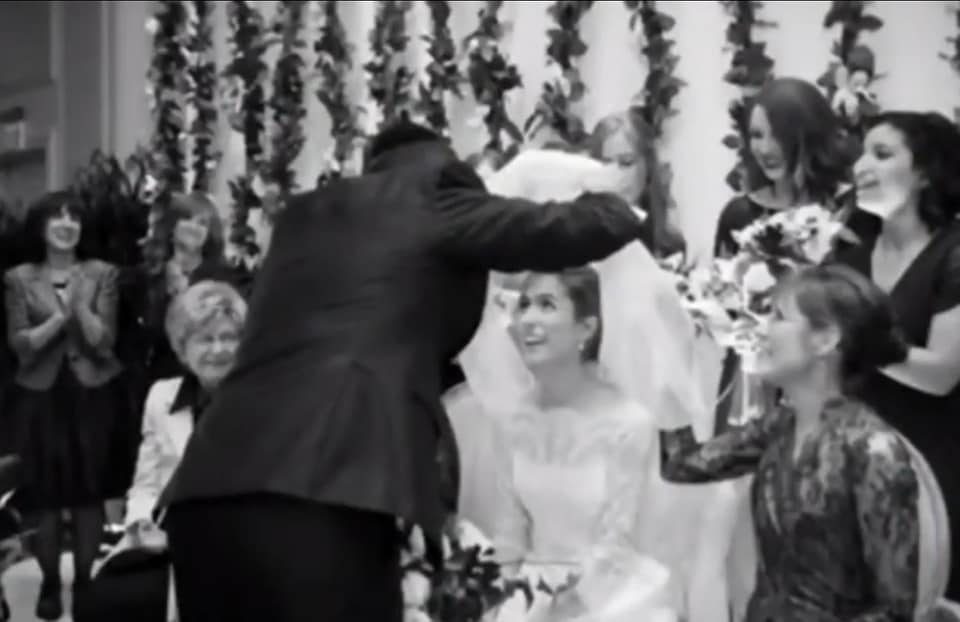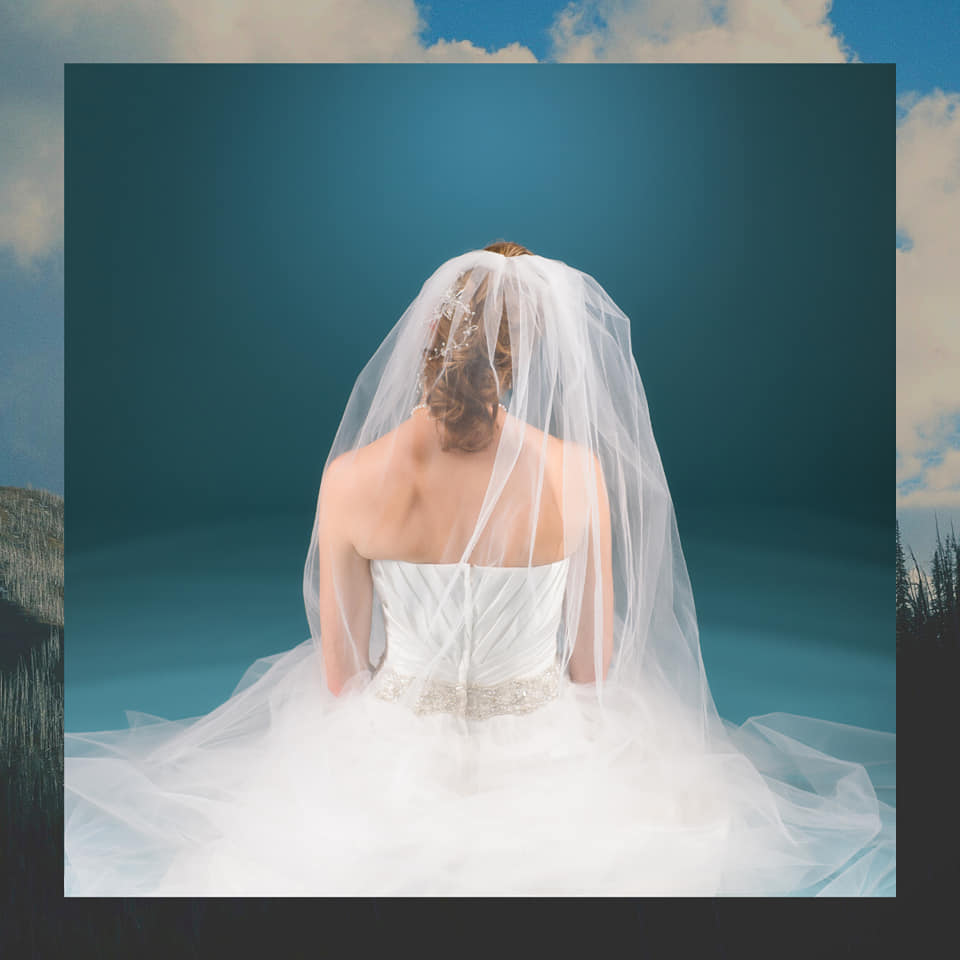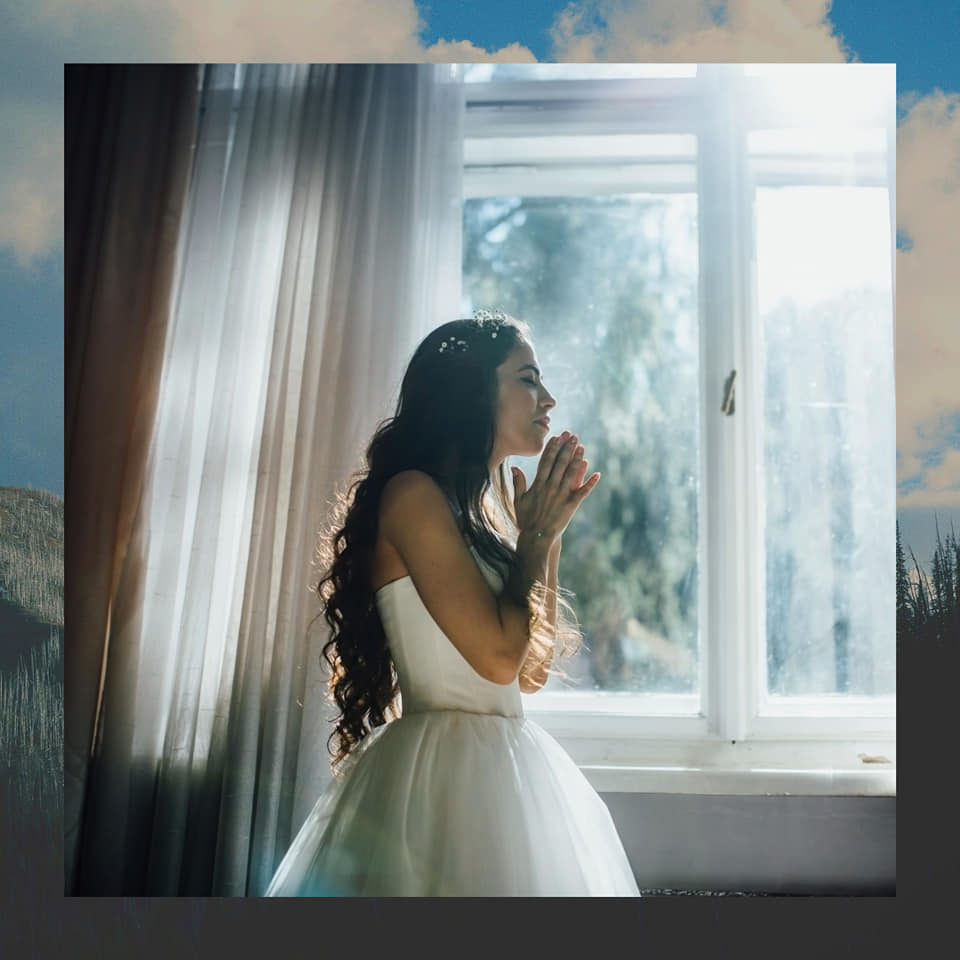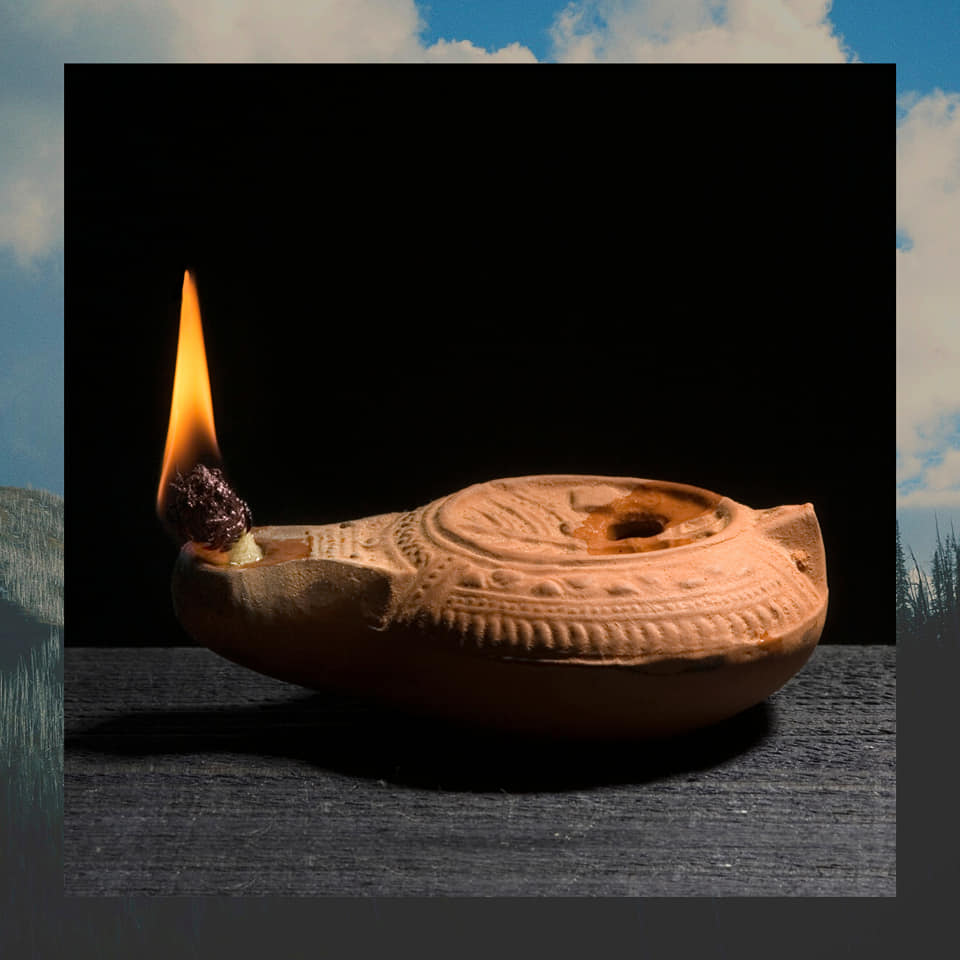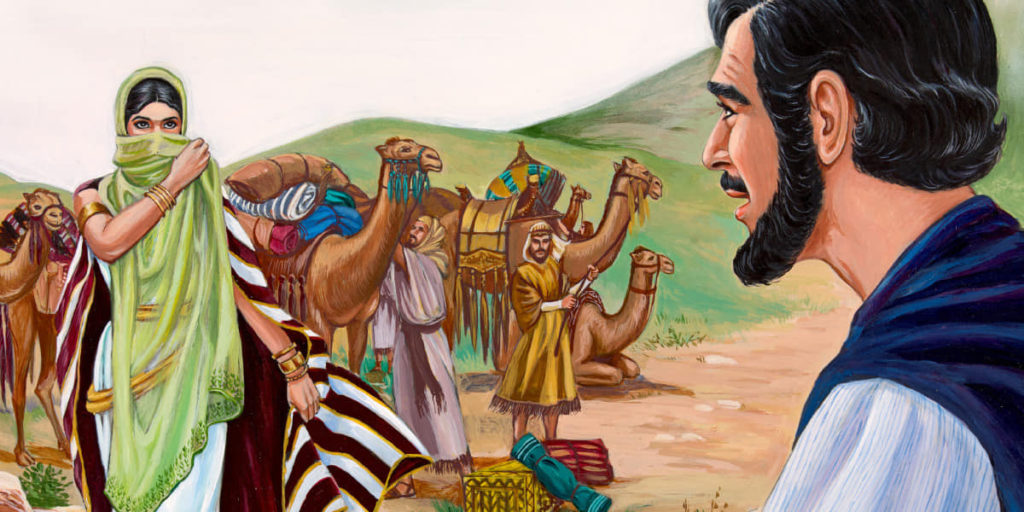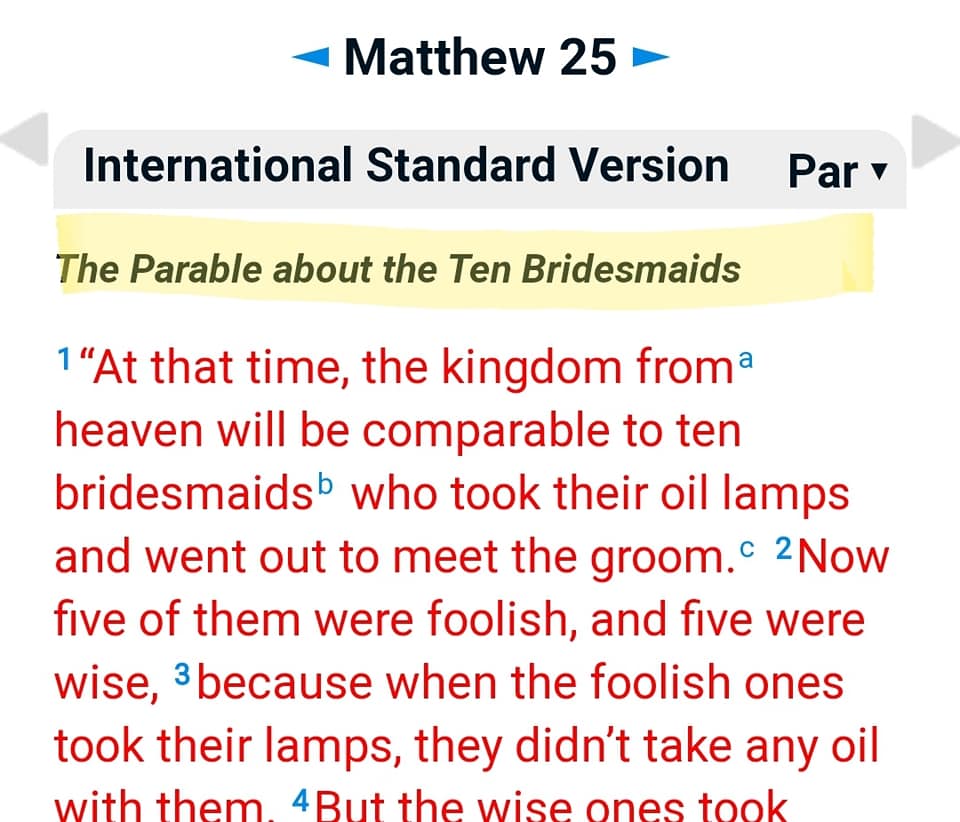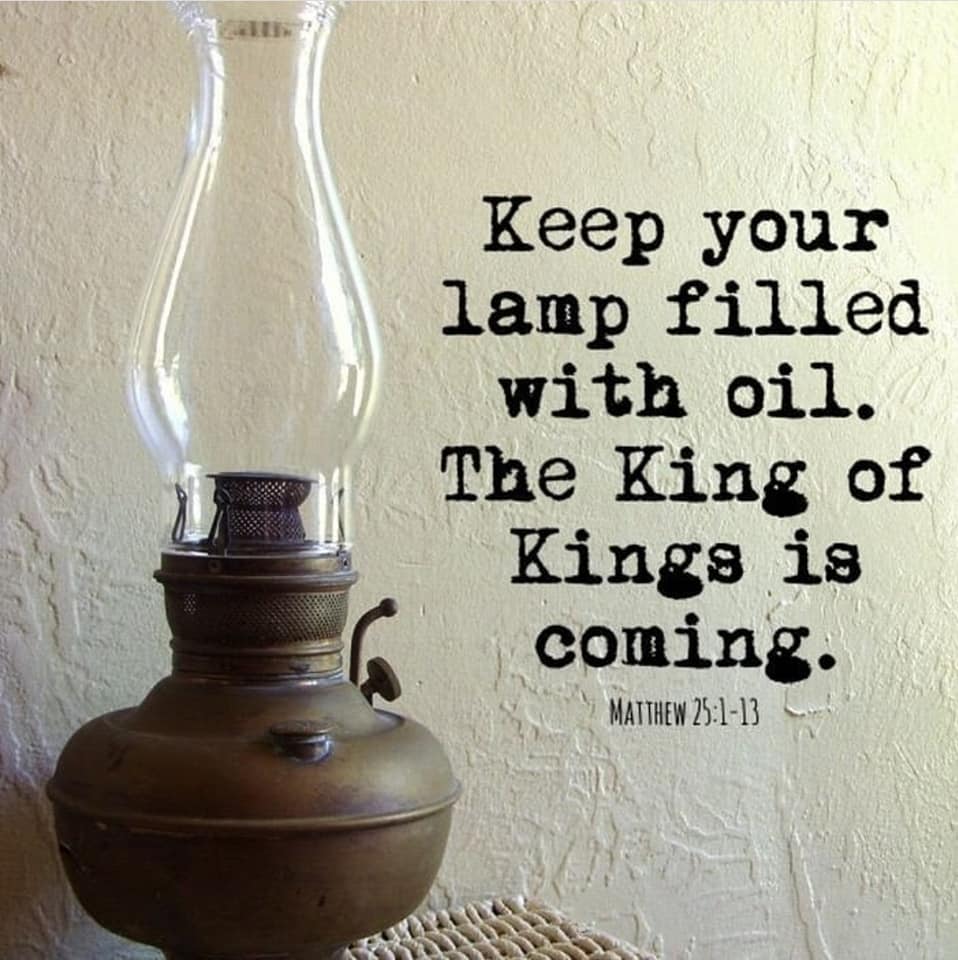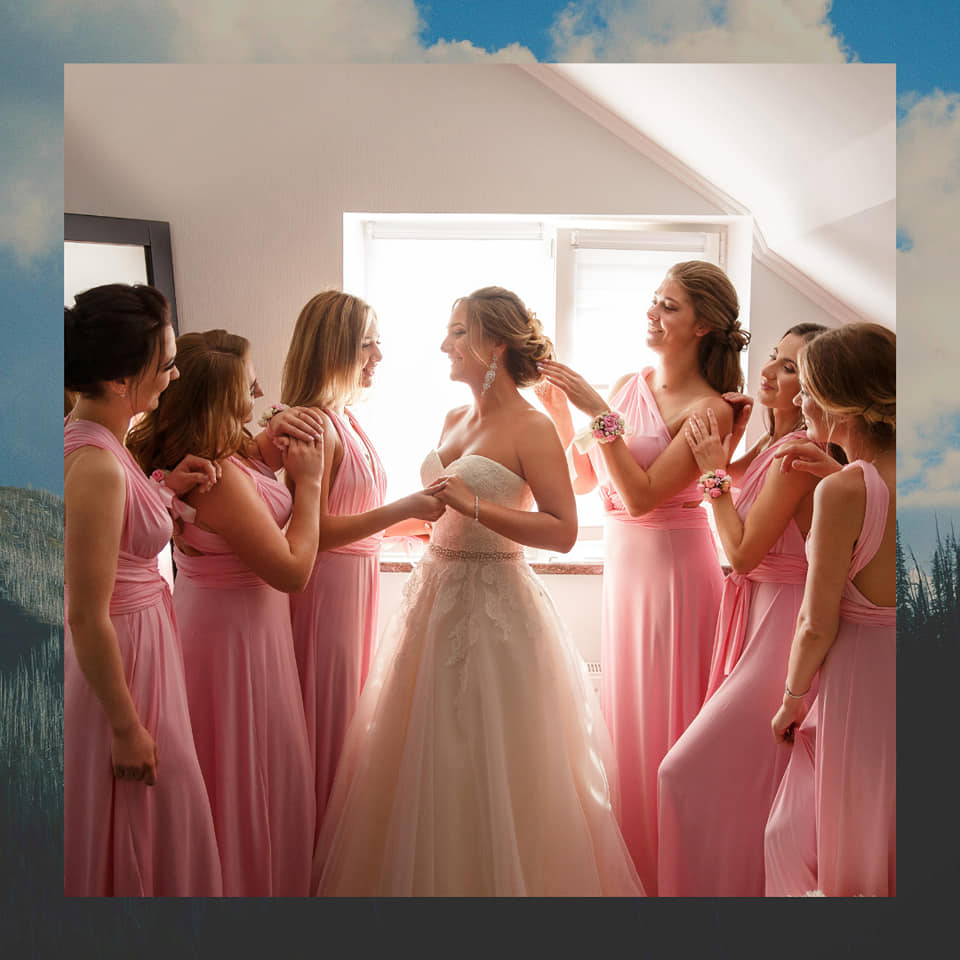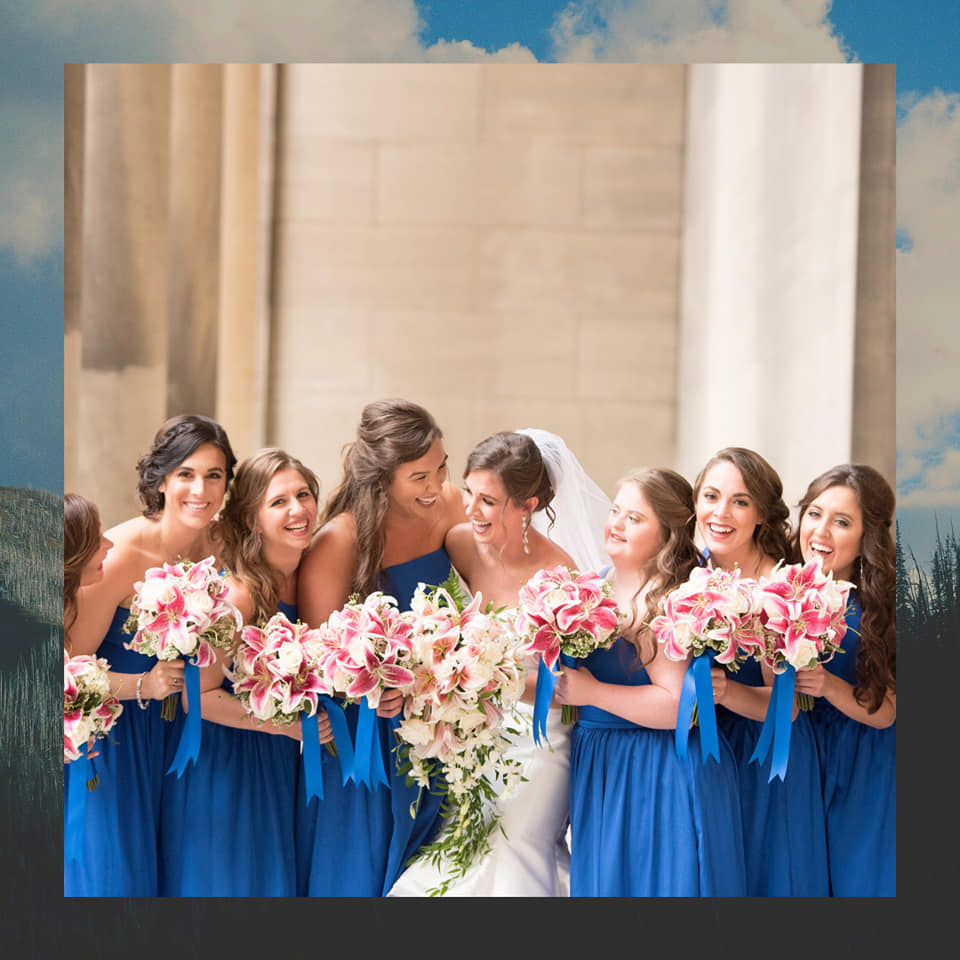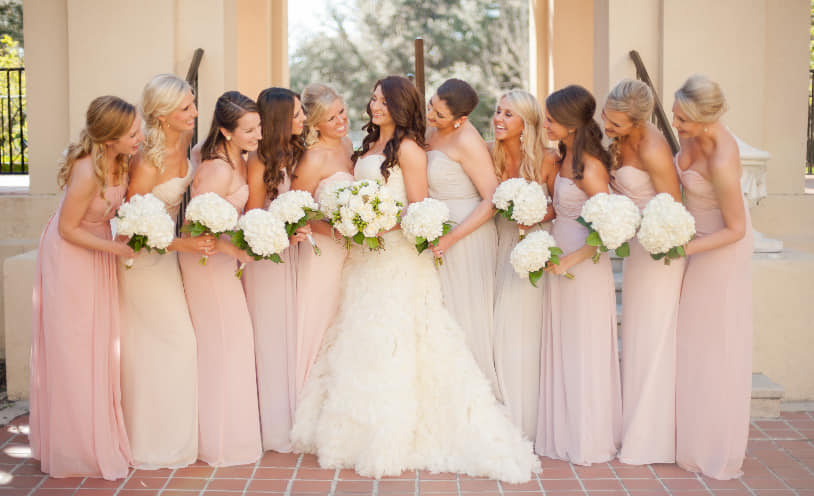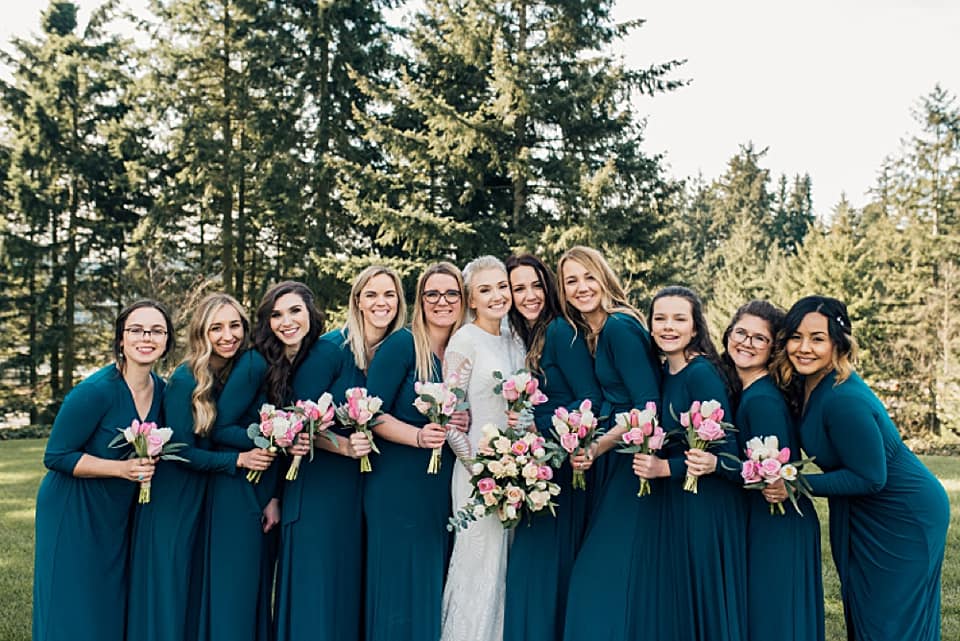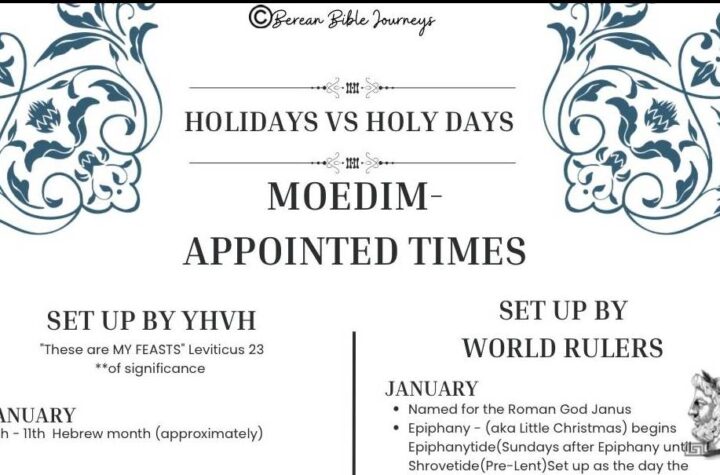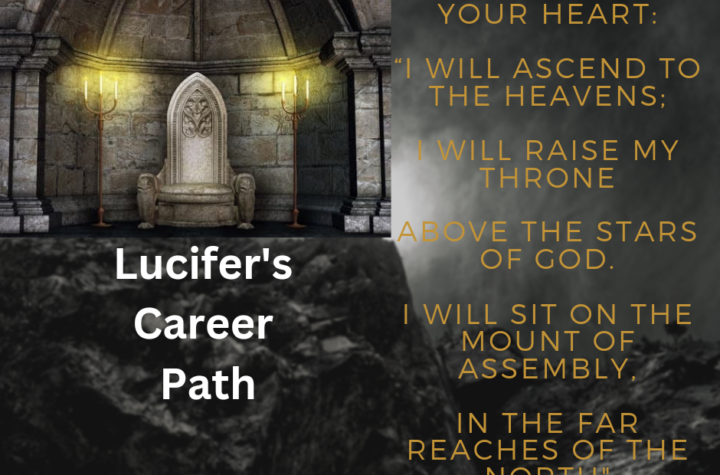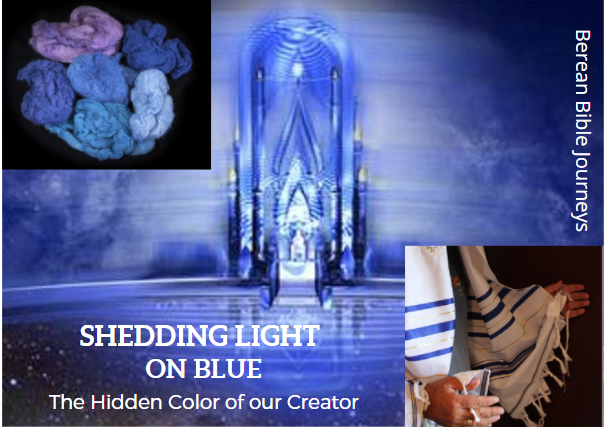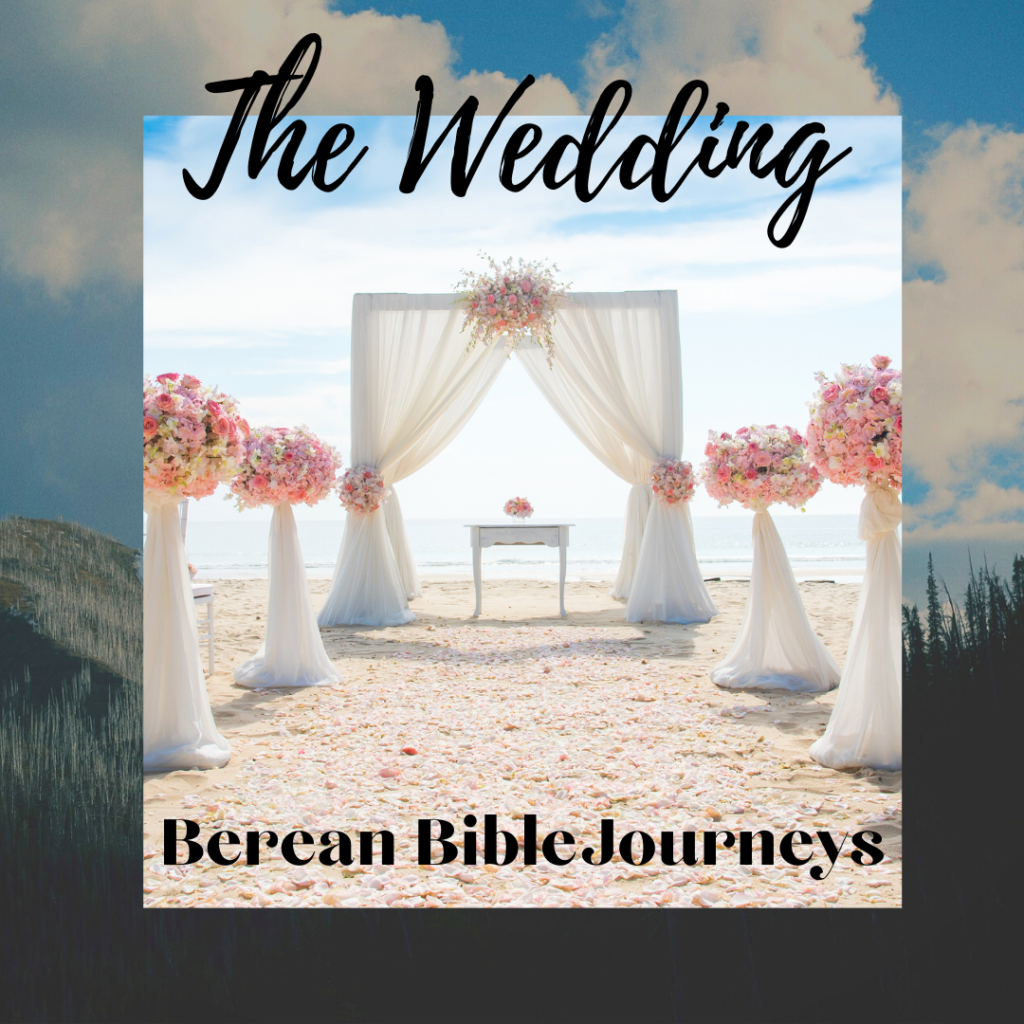
#TINK #TINKWEDDINGS
This is collection of teachings covering the parallels of the ancient Hebrew weddings to the Scriptures…and how these traditions have been handed down into our modern Weddings and we have not even realized where they originated from or how they apply to our walk with Christ. Mind-blowing revelation that will start a fire down in your soul!
![]() I never knew why most couples get married under a canopy or arch.
I never knew why most couples get married under a canopy or arch. ![]()
![]() Start looking carefully at all the wedding photos on your timeline, and notice the huppa.
Start looking carefully at all the wedding photos on your timeline, and notice the huppa.![]()
![]() What is a huppa or chuppa? (khoop-uh, khoop-ah, hoop-uh)Merriam-webster says a huppah is a canopy under which the bride and groom stand during a Jewish wedding ceremony.
What is a huppa or chuppa? (khoop-uh, khoop-ah, hoop-uh)Merriam-webster says a huppah is a canopy under which the bride and groom stand during a Jewish wedding ceremony.![]() But you will notice that this idea has transferred over and is included in many weddings and in many cultures.
But you will notice that this idea has transferred over and is included in many weddings and in many cultures.![]() I discovered that, in a Jewish wedding, the huppah is symbolic of the very first marriage Covenant in Scripture.
I discovered that, in a Jewish wedding, the huppah is symbolic of the very first marriage Covenant in Scripture. ![]() Where does this occur? I never knew that this took place at the base of Mt. Sinai when YHVH gave the 10 Commandments.
Where does this occur? I never knew that this took place at the base of Mt. Sinai when YHVH gave the 10 Commandments. ![]() Remember, Yahweh descended on the mountain with smoke and fire and proposed…a covenant.
Remember, Yahweh descended on the mountain with smoke and fire and proposed…a covenant.![]()
![]()
![]() He presented His commandments and all of the people said “I will”
He presented His commandments and all of the people said “I will”
“And all the people answered together, and said, All that the LORD hath spoken WE WILL do. And Moses returned the words of the people unto the LORD.” Exodus 19:8″So Moses came and told the people all the words of the LORD and all the judgments. And all the people answered with one voice and said, ‘All the words which the LORD has said WE WILL do.'” Exodus 24:4This is where we get the “I do” or I will” part of our weddings. It is a covenant agreement. ![]() The huppah, is a symbol of the smoke that descended and covered Mt. Sinai. Exodus 19: “Behold I will come to you in a dense cloud.
The huppah, is a symbol of the smoke that descended and covered Mt. Sinai. Exodus 19: “Behold I will come to you in a dense cloud. ![]() Verse 16 “A thick cloud covered the mountain.”
Verse 16 “A thick cloud covered the mountain.”![]()
![]() In a Jewish ceremony, the huppah is made of the groom’s tallit (prayer shawl) It is said that the divine name hovers above the huppah, sanctifying the space below.It symbolizes the home or tent that they will share and is open on all sides because tradition says that Abraham and Sarah’s tent was open on all sides when he welcomed the three strangers. It gives a whole new layer of meaning to “Dearly beloved, we are gathered here today in the sight of God and these witnesses…”
In a Jewish ceremony, the huppah is made of the groom’s tallit (prayer shawl) It is said that the divine name hovers above the huppah, sanctifying the space below.It symbolizes the home or tent that they will share and is open on all sides because tradition says that Abraham and Sarah’s tent was open on all sides when he welcomed the three strangers. It gives a whole new layer of meaning to “Dearly beloved, we are gathered here today in the sight of God and these witnesses…”![]()
![]() From the simplest to the most elaborate wedding, there is usually that huppah, at the altar, unknowingly acknowledging the very first covenant at Mt. Sinai
From the simplest to the most elaborate wedding, there is usually that huppah, at the altar, unknowingly acknowledging the very first covenant at Mt. Sinai ![]() under the cloud.
under the cloud.![]() I pray you never see another wedding picture the same.
I pray you never see another wedding picture the same. ![]()
![]()
![]()
![]() Imagine if everyone, believer and unbeliever, realized what that wedding arch represented?!Find and post a picture of your wedding huppah if you have one. Be sure and tag #bereanbiblejourneys and #tinkweddings
Imagine if everyone, believer and unbeliever, realized what that wedding arch represented?!Find and post a picture of your wedding huppah if you have one. Be sure and tag #bereanbiblejourneys and #tinkweddings
![]() I never knew that Jewish fathers choose the bride for their son.
I never knew that Jewish fathers choose the bride for their son.![]() Again, the sons did not choose their own brides. It was up to the Father, either on his own, or through a servant or messenger, to find a suitable mate for his sons.
Again, the sons did not choose their own brides. It was up to the Father, either on his own, or through a servant or messenger, to find a suitable mate for his sons. ![]() This is short but foundational for the next TINKWEDDINGS.
This is short but foundational for the next TINKWEDDINGS. ![]()
![]()
![]() As we go through these, you will realize more fully that marriage was an institute created by the Creator. And He uses these marriage details to teach His creation. Through the natural elements of a wedding, He reveals His prophecies and plans.
As we go through these, you will realize more fully that marriage was an institute created by the Creator. And He uses these marriage details to teach His creation. Through the natural elements of a wedding, He reveals His prophecies and plans. ![]()
![]() The first step in the Jewish/Hebrew wedding was the betrothal. They did not have forced marriages but you might say they had arranged marriages. The father actually picked out a bride for his son.
The first step in the Jewish/Hebrew wedding was the betrothal. They did not have forced marriages but you might say they had arranged marriages. The father actually picked out a bride for his son. ![]() We see this scenario prophetically laid out in the story of Isaac and Rebecca. Genesis 24. Abraham (the Father) sends his servant (the Holy Spirit) to seek out a bride for his son Issac (Jesus/Yeshua).
We see this scenario prophetically laid out in the story of Isaac and Rebecca. Genesis 24. Abraham (the Father) sends his servant (the Holy Spirit) to seek out a bride for his son Issac (Jesus/Yeshua). ![]() “And Abraham said unto his eldest servant of his house, go unto my country and to my kindred and take a wife unto my son Isaac.”
“And Abraham said unto his eldest servant of his house, go unto my country and to my kindred and take a wife unto my son Isaac.” ![]() As this tradition was still the norm during Jesus’ days, he revealed this betrothal connection in John 6:44 when He said that no man can come to the Son unless he is drawn by the Father.
As this tradition was still the norm during Jesus’ days, he revealed this betrothal connection in John 6:44 when He said that no man can come to the Son unless he is drawn by the Father.
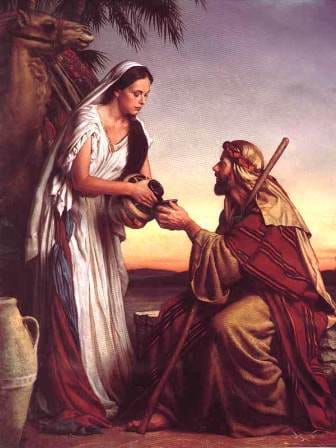
![]() 1 Peter 2:9 tells us that we are a chosen race, a royal priesthood? A holy nation, a people for His own possession….
1 Peter 2:9 tells us that we are a chosen race, a royal priesthood? A holy nation, a people for His own possession…. ![]()
![]() The word for chosen is the Greek word “eklektos” meaning “chosen out, elect. (Rabbit trail for later: This is the same word often translated as “elect”.)
The word for chosen is the Greek word “eklektos” meaning “chosen out, elect. (Rabbit trail for later: This is the same word often translated as “elect”.)![]()
![]() And in John 15:16 Jesus told His disciples, You did not choose me, but I chose you and appointed you that you should go and bear fruit….
And in John 15:16 Jesus told His disciples, You did not choose me, but I chose you and appointed you that you should go and bear fruit….![]() The bride is chosen by the Father, wooed by the Holy Spirit, to be betrothed to the Son.
The bride is chosen by the Father, wooed by the Holy Spirit, to be betrothed to the Son.![]()
![]() As Paul explained to the believers at Corinth… “I have betrothed you to one husband, to present a pure virgin to Christ.” 2 Corinthians 11:2
As Paul explained to the believers at Corinth… “I have betrothed you to one husband, to present a pure virgin to Christ.” 2 Corinthians 11:2![]() Today, only a few Jewish sects still hold this tradition of the father choosing His son’s bride. The idea has been converted into receiving the parent’s blessing on the match. This is prevalent today, even in non-believing couples and cultures. It is something weaved into our world and most never question how the tradition began.
Today, only a few Jewish sects still hold this tradition of the father choosing His son’s bride. The idea has been converted into receiving the parent’s blessing on the match. This is prevalent today, even in non-believing couples and cultures. It is something weaved into our world and most never question how the tradition began.
![]() I never knew that the bride price
I never knew that the bride price ![]() (what we would call dowry) was prophetic imagery.
(what we would call dowry) was prophetic imagery. ![]() Now that the father has chosen the bride for his son, they would head to the prospective bride’s house. The groom would need to have the Ketubah, some gifts, and some wine.
Now that the father has chosen the bride for his son, they would head to the prospective bride’s house. The groom would need to have the Ketubah, some gifts, and some wine.![]()
![]()
![]()
![]() First, let’s look at this ketubah. A Ketubah is a covenant, or a binding agreement between two parties, the same as what we would call being married today, except that a Jewish betrothal was as binding as a wedding ceremony. It was the same as being married.
First, let’s look at this ketubah. A Ketubah is a covenant, or a binding agreement between two parties, the same as what we would call being married today, except that a Jewish betrothal was as binding as a wedding ceremony. It was the same as being married. ![]() If you recall, Joseph and Mary were betrothed, and when Joseph learned that Mary was carrying a child, he had in mind to put her away/divorce her quietly. Matthew 1:19
If you recall, Joseph and Mary were betrothed, and when Joseph learned that Mary was carrying a child, he had in mind to put her away/divorce her quietly. Matthew 1:19![]()
![]() This Ketubah outlines the conditions that the groom will provide in the marriage: ie. a home and protection, the bride’s rights and protections. It also outlines the framework, in case the couple should divorce. Fast forward to today and you can see that the Ketubah is still visible in our Christian marriages.
This Ketubah outlines the conditions that the groom will provide in the marriage: ie. a home and protection, the bride’s rights and protections. It also outlines the framework, in case the couple should divorce. Fast forward to today and you can see that the Ketubah is still visible in our Christian marriages. ![]() It’s the marriage license and prenuptial agreement. Today it is signed off on at your wedding, usually by the officiating minister. In a Jewish wedding, it would have been the rabbi and two other witnesses that signed off on the ketubah before the ceremony.
It’s the marriage license and prenuptial agreement. Today it is signed off on at your wedding, usually by the officiating minister. In a Jewish wedding, it would have been the rabbi and two other witnesses that signed off on the ketubah before the ceremony.
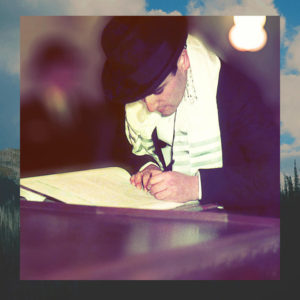
![]() Included in the Ketubah, would be the agreed upon price for the bride. It was the price to redeem her or purchase her. This is not like purchasing her like chattel, but more like transferring her talents and contributions from her father’s house to her new husband’s home.
Included in the Ketubah, would be the agreed upon price for the bride. It was the price to redeem her or purchase her. This is not like purchasing her like chattel, but more like transferring her talents and contributions from her father’s house to her new husband’s home. ![]() Recall this when you read,
Recall this when you read, ![]() “you are not your own, you have been bought with a price”.
“you are not your own, you have been bought with a price”.![]() 1 Corinthians 6:20
1 Corinthians 6:20![]() Ye are bought with a price;
Ye are bought with a price;![]() 1 Corinthians 7:23
1 Corinthians 7:23![]() “In Him we have redemption
“In Him we have redemption ![]() through his blood, the forgiveness of sins” Ephesians 1:7
through his blood, the forgiveness of sins” Ephesians 1:7![]() Redemption in these verses is from the Greek word “apolutrósis” meaning a release on payment of ransom
Redemption in these verses is from the Greek word “apolutrósis” meaning a release on payment of ransom![]() emphasizes the distance (“safety-margin”) that results between the rescued person, and what previously enslaved them.
emphasizes the distance (“safety-margin”) that results between the rescued person, and what previously enslaved them.![]() “He sent redemption
“He sent redemption ![]() to his people; he has commanded his covenant forever. Holy and awesome is his name!” Psalm 111:9
to his people; he has commanded his covenant forever. Holy and awesome is his name!” Psalm 111:9
![]() The previous post was about being the bride being chosen and now we understand about the bride being purchased.
The previous post was about being the bride being chosen and now we understand about the bride being purchased. ![]() Isaiah 43:1-3
Isaiah 43:1-3 ![]() Yes, do not fear for I have REDEEMED
Yes, do not fear for I have REDEEMED ![]() you I have CALLED you by your name and you are mine.
you I have CALLED you by your name and you are mine.![]() “And they sung a new song, saying, Thou art worthy to take the book, and to open the seals thereof: for thou wast slain, and hast REDEEMED
“And they sung a new song, saying, Thou art worthy to take the book, and to open the seals thereof: for thou wast slain, and hast REDEEMED ![]() us to God by thy blood out of every kindred, and tongue, and people, and nation; Revelation 5:9
us to God by thy blood out of every kindred, and tongue, and people, and nation; Revelation 5:9![]() Keep in mind where we are in this Jewish wedding: they have drawn up the Ketubah and agreed upon this bride price, but the groom still has to ask the lady to marry him.
Keep in mind where we are in this Jewish wedding: they have drawn up the Ketubah and agreed upon this bride price, but the groom still has to ask the lady to marry him.
![]() I never knew what Jesus/Yeshua really meant by standing at the door and knocking.
I never knew what Jesus/Yeshua really meant by standing at the door and knocking.![]()
![]() The father has chosen the bride, and he and the son have drawn up a covenant and paid the bride price. Now the groom must ask the lady.
The father has chosen the bride, and he and the son have drawn up a covenant and paid the bride price. Now the groom must ask the lady.![]()
![]() In the story of Isaac and Rebecca, the servant was ready to take Rebecca home to Isaac…. but her family said, “we’ll call Rebecca and ask her what she thinks”. So they called Rebecca, “are you willing to go with this man” they asked her, and she replied, “Yes, I will go.”Genesis 24:56-58
In the story of Isaac and Rebecca, the servant was ready to take Rebecca home to Isaac…. but her family said, “we’ll call Rebecca and ask her what she thinks”. So they called Rebecca, “are you willing to go with this man” they asked her, and she replied, “Yes, I will go.”Genesis 24:56-58![]() Traditionally speaking, all the gentleman had to do was knock on the door and offer the young lady, some wine. If she accepts and takes a sip of that wine then she is pretty much declaring her undying love to him, and they are as good as married. I think some modern men today could appreciate the simplicity of this proposal.
Traditionally speaking, all the gentleman had to do was knock on the door and offer the young lady, some wine. If she accepts and takes a sip of that wine then she is pretty much declaring her undying love to him, and they are as good as married. I think some modern men today could appreciate the simplicity of this proposal.
If she accepts, he will then present her with gifts, many times a ring.![]() Then they would all share a meal together.
Then they would all share a meal together. ![]()
![]()
![]() Again with Isaac and Rebecca. Scripture says “then he brought out jewels of silver and gold and articles of clothing and he gave them to Rebecca. He also gave precious gift to her brother and her mother, and then he and the man with him, ate and drank and spent the night there”.
Again with Isaac and Rebecca. Scripture says “then he brought out jewels of silver and gold and articles of clothing and he gave them to Rebecca. He also gave precious gift to her brother and her mother, and then he and the man with him, ate and drank and spent the night there”.![]()
![]() So that was the traditional protocol, he knocks, offers her the wine, he gives her gifts, and then they share a meal together. So weaving in the word now, what Scripture is coming to your mind about knocking and sharing a meal.
So that was the traditional protocol, he knocks, offers her the wine, he gives her gifts, and then they share a meal together. So weaving in the word now, what Scripture is coming to your mind about knocking and sharing a meal.![]()
![]() “Behold I stand at the door knock. If any man hear my voice. I will come into him and will sup with him, and he with Me.” Revelation 3:20
“Behold I stand at the door knock. If any man hear my voice. I will come into him and will sup with him, and he with Me.” Revelation 3:20![]()
![]()
![]() I had no clue until recently, that that was a parallel to a Jewish betrothal.
I had no clue until recently, that that was a parallel to a Jewish betrothal.![]()
![]()
![]() Jump forward to our modern engagements and we see that not a lot has changed. The gentlemen are still asking the ladies for their hand, the styles and the settings may vary, but the idea is the same, and they are still sealing the engagement with wine and gifts.
Jump forward to our modern engagements and we see that not a lot has changed. The gentlemen are still asking the ladies for their hand, the styles and the settings may vary, but the idea is the same, and they are still sealing the engagement with wine and gifts.![]()
![]() Did not the Holy Spirit give you gifts when you accepted His proposal??
Did not the Holy Spirit give you gifts when you accepted His proposal??![]()
![]() “There are different kinds of gifts. But they are all given to believers by the same Spirit.” 1 Corinthians 12:4
“There are different kinds of gifts. But they are all given to believers by the same Spirit.” 1 Corinthians 12:4
![]() I never knew that Jesus/Yeshua used betrothal language with His disciples.
I never knew that Jesus/Yeshua used betrothal language with His disciples.![]()
![]()
![]()
![]() The Jewish/Hebrew couple has come to an agreement, and they have shared a meal and the wine.
The Jewish/Hebrew couple has come to an agreement, and they have shared a meal and the wine. ![]() And now, the groom has to leave. He goes away for usually a period of a year. He goes back to his father’s house, and he builds an addition or a bridal chamber onto his father’s house. And he tells his pretty bride.
And now, the groom has to leave. He goes away for usually a period of a year. He goes back to his father’s house, and he builds an addition or a bridal chamber onto his father’s house. And he tells his pretty bride.![]() “Listen, honey.I am going to make a house for you, and I will be back for you when it’s ready.”
“Listen, honey.I am going to make a house for you, and I will be back for you when it’s ready.”![]()
![]() Or he might say something like Jesus said to His disciples in John 14:3 …” and if I go and prepare a place for you, I will come again and receive you unto Myself that where I am there you may be also.”
Or he might say something like Jesus said to His disciples in John 14:3 …” and if I go and prepare a place for you, I will come again and receive you unto Myself that where I am there you may be also.”![]()
![]() Are you serious? Did you get that?
Are you serious? Did you get that?![]()
![]() So Jesus was using betrothal language when he spoke to His disciples.
So Jesus was using betrothal language when he spoke to His disciples.![]()
![]() “In my Father’s house are many mansions: if it were not so, I would have told you. I go to prepare a place for you. And if I go and prepare a place for you, I will come again, and receive you unto myself; that where I am, there ye may be also.”
“In my Father’s house are many mansions: if it were not so, I would have told you. I go to prepare a place for you. And if I go and prepare a place for you, I will come again, and receive you unto myself; that where I am, there ye may be also.” ![]() John 14:2-3
John 14:2-3![]() “Ye have heard how I said unto you, I go away, and come again unto you. If ye loved me, ye would rejoice, because I said, I go unto the Father: for my Father is greater than I. 29And now I have told you before it come to pass, that, when it is come to pass, ye might believe.”
“Ye have heard how I said unto you, I go away, and come again unto you. If ye loved me, ye would rejoice, because I said, I go unto the Father: for my Father is greater than I. 29And now I have told you before it come to pass, that, when it is come to pass, ye might believe.”![]() John 14:28-29
John 14:28-29
![]() I never knew about the veiling of the bride.
I never knew about the veiling of the bride.![]()
![]() While the groom has gone back to his father’s house to prepare a place for her, the bride will be at home preparing herself for her future groom.
While the groom has gone back to his father’s house to prepare a place for her, the bride will be at home preparing herself for her future groom.![]()
![]() One thing that she does is she will put on a veil, when she goes out, to show modesty and her new status as a betrothed woman.
One thing that she does is she will put on a veil, when she goes out, to show modesty and her new status as a betrothed woman. ![]() The veil also shows that she is considered hidden and spoken for, and that she has been bought with a price.
The veil also shows that she is considered hidden and spoken for, and that she has been bought with a price.![]()
![]() We see this in Scripture when “Rebecca lifted up her eyes and when she saw Isaac she dismounted from the camel. And then she took her veil and covered herself.” Genesis 24:64-65
We see this in Scripture when “Rebecca lifted up her eyes and when she saw Isaac she dismounted from the camel. And then she took her veil and covered herself.” Genesis 24:64-65![]()
![]() In a modern Jewish wedding, there is a ceremony before the ceremony where the groom comes to the bridal party and “veils” the bride. He physically places the veil over his bride in preparation for her to walk down the aisle.
In a modern Jewish wedding, there is a ceremony before the ceremony where the groom comes to the bridal party and “veils” the bride. He physically places the veil over his bride in preparation for her to walk down the aisle. ![]()
![]() It was also custom in the ancient Jewish betrothal for the waiting bride to keep a full oil lamp
It was also custom in the ancient Jewish betrothal for the waiting bride to keep a full oil lamp![]() , and her veil, and anything she might need for her new home, by her
, and her veil, and anything she might need for her new home, by her ![]() bedside in case the groom came during the night.
bedside in case the groom came during the night. ![]() She was to be ready for him to come and get her at all times.
She was to be ready for him to come and get her at all times.![]()
![]() In scripture, oil was used to anoint kings and priests and prophets, to set them apart as Holy to YHVH. This anointing represented the initial coming of the Holy Spirit in their lives
In scripture, oil was used to anoint kings and priests and prophets, to set them apart as Holy to YHVH. This anointing represented the initial coming of the Holy Spirit in their lives
![]() The lamp in the Tabernacle, called the menorah, was the only light in the temple, lit by pure olive oil. It was to be kept burning continually, forever. (Leviticus 24:1-3)
The lamp in the Tabernacle, called the menorah, was the only light in the temple, lit by pure olive oil. It was to be kept burning continually, forever. (Leviticus 24:1-3)![]() Jesus told us He is the light of the world and then He said “Ye are the light of the world. (John 8:12, John 12:46, Matthew 5:14-16) The Hebrew term translated, “Messiah” as well as the Greek term, “Christ,” means, “The anointed one.” Anoint in both Hebrew and Greek literally means “to smear with oil, paint”.
Jesus told us He is the light of the world and then He said “Ye are the light of the world. (John 8:12, John 12:46, Matthew 5:14-16) The Hebrew term translated, “Messiah” as well as the Greek term, “Christ,” means, “The anointed one.” Anoint in both Hebrew and Greek literally means “to smear with oil, paint”. ![]() In addition, the oil was used for healing (James 5:14) and it illuminates the Word for our understanding. (1 John 2:20 & 27)
In addition, the oil was used for healing (James 5:14) and it illuminates the Word for our understanding. (1 John 2:20 & 27)![]() In short, the oil represents the light of the Messiah and the Holy Spirit in us.
In short, the oil represents the light of the Messiah and the Holy Spirit in us.![]()
![]() Since our groom is currently away preparing a place for us, we must prepare for our groom. We must stay full of the light and the fire of the Holy Spirit.
Since our groom is currently away preparing a place for us, we must prepare for our groom. We must stay full of the light and the fire of the Holy Spirit. ![]() “Let your light so shine before men, that they may see your good works, and glorify your Father which is in heaven.”
“Let your light so shine before men, that they may see your good works, and glorify your Father which is in heaven.”![]()
![]() Currently, we are veiled, modest, hidden in Him, spoken for, bought with a precious price, and betrothed to Christ the anointed one.
Currently, we are veiled, modest, hidden in Him, spoken for, bought with a precious price, and betrothed to Christ the anointed one.
![]() The book of Revelation is the Greek word Apocalypse and actually means “the revealing” or “the unveiling”. One encompassing feature of all end times events is the revealing or unveiling
The book of Revelation is the Greek word Apocalypse and actually means “the revealing” or “the unveiling”. One encompassing feature of all end times events is the revealing or unveiling ![]() of the bride of Christ. As He separates the wheat from the tares and refines us with fire, the bride will shine brightly in an ever darkening world.
of the bride of Christ. As He separates the wheat from the tares and refines us with fire, the bride will shine brightly in an ever darkening world. ![]()
![]()
![]() The world may be reeling out of control “But you have an anointing from the Holy One, and all of you know the truth.” (1 John 2:20 CEV)In the Amplified version it reads, “But you have an anointing from the Holy One [you have been set apart, specially gifted and prepared by the Holy Spirit], and all of you know [the truth because He teaches us, illuminates our minds, and guards us from error].”Goodness, I feel as if I barely scratched the surface of this. There were so many rabbit
The world may be reeling out of control “But you have an anointing from the Holy One, and all of you know the truth.” (1 John 2:20 CEV)In the Amplified version it reads, “But you have an anointing from the Holy One [you have been set apart, specially gifted and prepared by the Holy Spirit], and all of you know [the truth because He teaches us, illuminates our minds, and guards us from error].”Goodness, I feel as if I barely scratched the surface of this. There were so many rabbit ![]() trails I could have taken off on. Maybe you can study in further. This theme is also “to be continued” in the next post when we meet the 10 virgins
trails I could have taken off on. Maybe you can study in further. This theme is also “to be continued” in the next post when we meet the 10 virgins
![]() I never knew the purpose of the 10 virgins in the parable Jesus told.
I never knew the purpose of the 10 virgins in the parable Jesus told. ![]() Jesus/Yeshua tells us a parable about 10 virgins in Matthew 25:1-13.
Jesus/Yeshua tells us a parable about 10 virgins in Matthew 25:1-13.![]() “Then the kingdom of heaven will be like ten virgins who took their lamps and went out to meet the bridegroom. Five of them were foolish and five were wise. The foolish ones, when taking their lamps, brought no oil with them, but the wise brought flasks of oil with their lamps.”
“Then the kingdom of heaven will be like ten virgins who took their lamps and went out to meet the bridegroom. Five of them were foolish and five were wise. The foolish ones, when taking their lamps, brought no oil with them, but the wise brought flasks of oil with their lamps.”![]()
![]() Why would they need oil anyway? Because in a traditional Hebrew wedding, the bridegroom
Why would they need oil anyway? Because in a traditional Hebrew wedding, the bridegroom ![]() usually came to get his bride
usually came to get his bride ![]() in the middle of the night; often at midnight.
in the middle of the night; often at midnight.![]() This is confirmed in Matthew 25:6-7 when it says “but at midnight
This is confirmed in Matthew 25:6-7 when it says “but at midnight![]() there was a shout, Behold, the bridegroom
there was a shout, Behold, the bridegroom![]() cometh, go ye out to meet him.”
cometh, go ye out to meet him.”![]()
![]() Who were these 10 virgins anyway? The 10 Virgins would have been her closest friends and they were supposed to help her prepare for the groom
Who were these 10 virgins anyway? The 10 Virgins would have been her closest friends and they were supposed to help her prepare for the groom![]() . They were to be ready and waiting to go out to meet him with her. They made sure she had oil in her lamp
. They were to be ready and waiting to go out to meet him with her. They made sure she had oil in her lamp![]() , and were to have oil in their lamps as well in case the bridegroom came in the middle of the night
, and were to have oil in their lamps as well in case the bridegroom came in the middle of the night![]() . They would need the light
. They would need the light ![]() to illuminate their way as they accompanied the bride
to illuminate their way as they accompanied the bride ![]() on her way to the wedding.
on her way to the wedding.
![]() So these 10 virgins, have you figured out where they come into play?
So these 10 virgins, have you figured out where they come into play? ![]() The 10 virgins have been handed down in our traditions. They still exist today even in our modern Christian weddings. They are the bridesmaids in your wedding. They came from the story of the 10 virgins and the ladies that were supposed to be helping the bride prepare for the groom to come and get her. Some Bible translations even refer to it as the parable of the 10 bridesmaids.So who were your bridesmaids in your earthly wedding? Did they help you prepare for your wedding? Did they help you get dressed for your groom? Did they help you prepare the place for the wedding? Did they keep you motivated and grounded? Were they there for you when you were overwhelmed and needed to cry and talk things out? Did they help you celebrate?
The 10 virgins have been handed down in our traditions. They still exist today even in our modern Christian weddings. They are the bridesmaids in your wedding. They came from the story of the 10 virgins and the ladies that were supposed to be helping the bride prepare for the groom to come and get her. Some Bible translations even refer to it as the parable of the 10 bridesmaids.So who were your bridesmaids in your earthly wedding? Did they help you prepare for your wedding? Did they help you get dressed for your groom? Did they help you prepare the place for the wedding? Did they keep you motivated and grounded? Were they there for you when you were overwhelmed and needed to cry and talk things out? Did they help you celebrate?![]()
![]() This is the purpose of your bridesmaids now and that was the purpose of the virgins then. To keep you on your toes and ready to meet your groom.
This is the purpose of your bridesmaids now and that was the purpose of the virgins then. To keep you on your toes and ready to meet your groom. ![]()
![]() Question: who is your bridesmaid today? Who is helping you prepare to meet your ultimate groom? Who is that person who gently corrects and guides you? Who prays with you and for you? Who, in your life, makes sure you always have oil in your lamp? I hope you have one of these bridesmaids in your life. If not, consider praying and asking God to show you who that person might be. And then ask them to be your bridesmaid.
Question: who is your bridesmaid today? Who is helping you prepare to meet your ultimate groom? Who is that person who gently corrects and guides you? Who prays with you and for you? Who, in your life, makes sure you always have oil in your lamp? I hope you have one of these bridesmaids in your life. If not, consider praying and asking God to show you who that person might be. And then ask them to be your bridesmaid.
![]() I never knew about a Jewish groom going to get his bride
I never knew about a Jewish groom going to get his bride![]()
![]() So the bride is at home preparing herself for marriage, and her bridesmaids are making sure she has oil
So the bride is at home preparing herself for marriage, and her bridesmaids are making sure she has oil ![]() in her lamp. And the groom
in her lamp. And the groom ![]() is back at his Father’s house building an addition for his new bride.
is back at his Father’s house building an addition for his new bride.![]() Now, the groom,
Now, the groom, ![]() he does not get to decide when he goes to get his bride
he does not get to decide when he goes to get his bride![]() . If someone were to ask him the date of his wedding, he would have to say,
. If someone were to ask him the date of his wedding, he would have to say, ![]()
![]() “Only my father knows”
“Only my father knows”![]()
![]() ….Because, when the father approves of the dwelling that the son has made for his bride, then he will say, “Son, you may go and get your bride.”
….Because, when the father approves of the dwelling that the son has made for his bride, then he will say, “Son, you may go and get your bride.” ![]() Only then, may he go and get her.Jesus/ Yeshua will return for his bride when?
Only then, may he go and get her.Jesus/ Yeshua will return for his bride when? ![]()
![]() Well, we don’t know.
Well, we don’t know. ![]() And the son doesn’t know
And the son doesn’t know![]() But only the Father knows.
But only the Father knows.
![]() “But concerning that day and hour no one knows, not even the angels of heaven, nor the Son, but the Father only.
“But concerning that day and hour no one knows, not even the angels of heaven, nor the Son, but the Father only. ![]() Be on guard! Be alert! You do not know when that time will come.
Be on guard! Be alert! You do not know when that time will come.![]() Watch therefore: for ye know not what hour your Lord doth come.” (Matthew 24, Mark 13)
Watch therefore: for ye know not what hour your Lord doth come.” (Matthew 24, Mark 13)![]() And Jesus comforted His disciples with this marriage allegory just before He was crucified.
And Jesus comforted His disciples with this marriage allegory just before He was crucified.![]() “Let not your heart be troubled: ye believe in God, believe also in me. In my Father’s house
“Let not your heart be troubled: ye believe in God, believe also in me. In my Father’s house ![]() are many mansions(Greek=dwelling places, abodes, rooms): if it were not so, I would have told you.
are many mansions(Greek=dwelling places, abodes, rooms): if it were not so, I would have told you. ![]()
![]() I go to prepare a place
I go to prepare a place![]() for you. And if I go and prepare a place for you, I will come again, and receive you unto myself; that where I am, there ye may be also. And whither I go ye know, and the way ye know….I am the way, the truth, and the life:
for you. And if I go and prepare a place for you, I will come again, and receive you unto myself; that where I am, there ye may be also. And whither I go ye know, and the way ye know….I am the way, the truth, and the life: ![]() no man cometh unto the Father, but by me
no man cometh unto the Father, but by me![]() .” John 14.In the context of marriage language, that last verse
.” John 14.In the context of marriage language, that last verse ![]() is saying, “You cannot come to the Father (YHVH) if you are not betrothed/in covenant with His Son.
is saying, “You cannot come to the Father (YHVH) if you are not betrothed/in covenant with His Son.![]()
![]()
![]() I never knew that Jesus/Yeshua was paralleling a Jewish wedding custom when speaking of His return in John 14.
I never knew that Jesus/Yeshua was paralleling a Jewish wedding custom when speaking of His return in John 14. ![]()
![]() IF YOU ARE ENJOYING THESE POSTS, PLEASE SHARE
IF YOU ARE ENJOYING THESE POSTS, PLEASE SHARE
